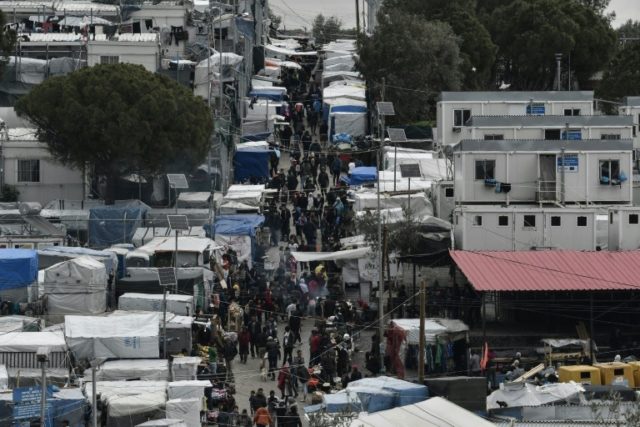Lesbos Island (Greece) (AFP) – In Europe’s biggest asylum seeker camp of Moria, on the Greek island of Lesbos, authorities are trying to keep residents apart from a population with at least three coronavirus cases.
But in a sprawling, overstretched facility that was already a health hazard before the virus made landfall in Greece, there is widespread concern.
“As you all know we are in corona time and… the (biggest) problem that we have is overcrowding inside these camps,” Mohamed Omid, an asylum seeker from Afghanistan posted on Facebook Tuesday from inside Moria.
There have been 20 recorded deaths and 743 officially announced infections from the coronavirus in Greece, which has a population of 11 million.
Three of the cases have been reported among Lesbos islanders.
There are nearly 38,000 people crammed into overstretched refugee centres on the islands of Lesbos, Samos, Chios, Leros and Kos.
Moria alone has over 19,000.
‘No chance of social distancing’
The European parliament’s civil liberties, justice and home affairs committee this week called for urgent measures to relieve pressure on the camps.
“Many of those in the camps are already in precarious health situations due to the bad conditions in which they have lived for a long time,” said Juan Fernando Lopez Aguilar, a Spanish socialist MEP who chairs the committee.
“There is no chance of isolation or social distancing, nor is it possible to ensure appropriate hygienic conditions,” he said, adding that there are only six intensive care beds available on Lesbos.
As the island camps were originally intended to handle around 6,000 people, many sleep outdoors in makeshift shelters with minimal access to hygiene.
‘Health bomb’
The situation was recently termed a “health bomb” by government spokesman Stelios Petsas.
In Moria, not everyone has access to water and refuse routinely piles up.
With staff and police now called away because of the lockdown, many residents are fearful.
“The virus has brought chaos… the police are not here, staff do not come,” said Sayed Nasid Haidari, an Afghan who used to work for the government in Kabul.
“Moria is divided into two groups. Around 20 percent are scared and hiding in their tents, and 80 percent are still walking around as if nothing is happening,” said Haidari, who has been at the camp with his son and pregnant wife since November.
“Before this is over, fear will bring more problems than the virus itself,” he added.
“We are afraid for our lives,” said Ιbrahim Mohament Hussein, a Somali former journalist who has been at the camp for six months.
“The food is not enough for all. We cannot go to market. We cannot feed our children.”
“The majority of the asylum seekers are aware of the coronavirus and stay at their tents, They also (hear) from relatives in other countries and they are scared,” the camp’s deputy manager Dimitris Vafeas, told AFP.
Nationwide lockdown
In recent weeks, asylum-seekers have begun banding together to protect themselves and others in the camp.
With help from Stand By Me, a Greek aid group, a group of Afghan women has sewn reusable cotton masks, as there is a nationwide shortage in protective gear.
Omid is part of MCAT, the Moria Corona Awareness Team, a Facebook group formed to help fellow asylum seekers stay ahead of the virus with information.
In the past week, refugee groups have also created different language teams denoted by a badge — white for Arabic, blue for Dari and Farsi — to organise orderly access to local supermarkets for the various nationalities in the camp.
Greece on Monday enforced a nationwide lockdown, limiting people to their homes except for essential outings.
In the camps, separate regulations have been announced to keep asylum seekers as distant from the local population as possible.
The migration ministry last week said it was “drastically” reducing the movement of camp residents on Greek islands, where the worst congestion occurs, but this week extended the restriction nationwide.
The ministry said that for the next 30 days, the movement of camp resident to nearby communities would be restricted to small groups between 7 am and 7 pm, and under police supervision.
Specialised medical teams were being deployed to the camps and virus isolation areas would be created.
Camp access to outside visitors is also barred, though aid and rights group representatives are still allowed to enter.

COMMENTS
Please let us know if you're having issues with commenting.